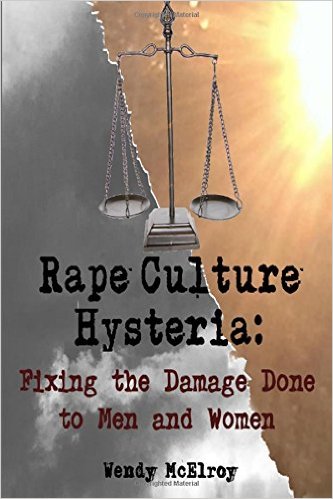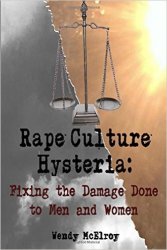I started reading McElroy’s new book, Rape Culture Hysteria: Fixing the Damage Done to Men and Women.
As I began, here were the questions on my mind:
1. Are rape rates at universities increasing, declining, or flat?
2. Are the rates higher on campuses than in the rest of the USA?
3. How often do rapes go unreported?
4. How frequent are false accusations of rape?
5. How frequent are cases like that of Brock Turner, who received a very light sentence for rape?
6. How often do universities follow due process internally in sexual assault cases, and how often do they properly turn over to the police the investigation of serious crimes such as rape?
7. What does saying there’s a rape culture mean? That the prevailing attitude among most people is one of toleration of rape? Or of tacit acceptance of rape? Or even of explicit endorsement of rape?
8. Is it more accurate that there may be rape sub-cultures in some universities?
9. Or is it true to say there are no cultures or subcultures of rape, only too many individuals who choose to be rapists?
The last question speaks to a major theme in McElroy’s book — the philosophical framing of the investigations and arguments. Awhile ago I posted a chart contrasting liberal and gender versions of feminism, with material drawn from McElroy’s Sexual Correctness. In this newer book, McElroy focuses on individualist versus PC feminism and the collision of philosophies embodied in individualism and political correctness.
Side note: I sometimes wonder if feminism is a useful label anymore. Feminism has generically meant a concern for achieving proper status for women, but the debated positions go by labels such as socialist feminism, radical feminism, gender feminism, liberal feminism, Marxist feminism, separatist feminism, Chicana feminism, postmodern feminism, trans-feminism, post-colonial feminism, and so on. The interesting and important debates always seem to be about the adjectives and not the noun.
But that may be part of the problem McElroy wants us to attend to — that the real agenda too often is not actually feminism but rather about using it as a vehicle to advance philosophies that end up being both anti-woman and anti-man.
McElroy quotes from an anonymous poster:
Four years ago, I was raped.
I didn’t ask for it. I didn’t want it. I didn’t deserve it.
I also, however, didn’t blame society.
I blamed the man who raped me.
The ‘Patriarchy’ did not assault me.
’Rape culture’ did not slip sleeping pills into my drink.
One man did.
And he did it not because he was taught to.
Not because society said he should.
He raped me because he is a bad person and we should not be
holding everyone accountable for bad people.
Don’t let rapists go free of responsibility by saying their choices are
made for them by society.
Bad people do bad things.
Don’t let them trick you into thinking that we are all to blame.
Related:
Campus Sex and the Anti-Sexiness of the New Authoritarians.
When Can Professors Have Sex With Their Students?
Update: María Blanco has this post on McElroy and the rape culture debates.


Good questions and looks like a very worthwhile book.
I’ve become increasingly uneasy about the label ‘feminist’ too, noting that some strains of feminism are toxic and others profoundly liberating and empowering to both sexes. Meryl Streep recently caused an uproar by saying she prefers the label ‘humanist.’
Some thoughts already written . . . I see doctrines, cultures, institutions, laws and policies that disenfranchise women in favor of privileging men as inimical to men as to women. I think they’re crutches created by and for disempowered, not empowered men – manifestations of insecurity, not confidence; of mediocrity, not greatness; of machismo, not masculinity. In my books machismo is an immature, self-alienated, pack-oriented caricature, and ultimately inversion of masculinity hostile to the values masculinity cherishes e.g. independence of thought and action, creative production, authenticity of feeling, integrity, liberty, women and children.
In my view no self-respecting man has anything to gain from such structures of privilege and everything to lose, hence it is to his most enlightened self-interest to contemptuously reject them as unworthy of him. Robbing a man of the ennobling challenge of a free woman such “privilege” dehumanizes and debases as well.
Holding before insecure, unformed men the carrot of disenfranchised, lobotomized female slaves is a divide and conquer ploy designed by impotent elites to rule men as well as women that robs both of their dignity, stature and rights. Authorities who fear independent, empowered women fear independent, empowered men for the reason neither are easily ruled. Most Western men have little desire to live as Taliban men or see their “male privilege” as enviable, clearly seeing that they too are profoundly disenfranchised and oppressed by their elites’ religious and social norms. Natural differences between the sexes are best realized on an equal playing field.
The sub-labelling is a universal problem, it not only concerns feminism, but also, to liberalism, Christianism, etc. And I think that it is the outcome of the terrible necessity of differentiation in a society of “masses” (in consumption, in habits, in the life style… specially, urban life). I say that I am a feminist because I share the values and objectives of the classical feminists, because if we look at other societies (and to some immigrant women) there’s still a long way to walk on in the search for equality before the law, and above all because all the discriminatory radical collectivist feminists get mad on me when I define myself as a libertarian and as a feminist. I hate her pretension of representing me (and the rest of women) and my liberty. I can defend myself without them and the state. And those are my reasons.
The culture of rape that Wendy is denouncing so courageously is an extreme of what we are living in Western countries: we have extended the victimization of women to the innate guiltiness of men. A shame.